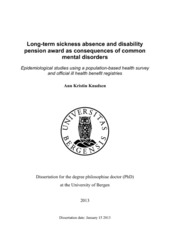Long-term sickness absence and disability pension award as consequences of common mental disorders. Epidemiological studies using a population-based health survey and official ill health benefit registries
Abstract
The common mental disorders anxiety and depression are widespread in the population and will affect 1 in 4 adults at least once during their lifetime. Due to high prevalence of common mental disorders within official benefit statistics, the contribution from these conditions on sickness absence and ill health retirement in the population is increasingly recognised. Sickness absence and ill health retirement rates have increased dramatically across the western world since the 1980s, and these high rates place enormous burdens on public expenditures. Sickness absence and ill health retirement may also have dire consequences for the individuals affected. In order to prevent and reduce sickness absence and ill health retirement, knowledge about causes and mechanisms is essential. These causes and mechanisms can not be identified using mere official benefit statistics or cross-sectional studies. The role of common mental disorders as risk factors for sickness absence and ill health retirement has only been examined in a handful of studies, with relatively short follow-up. Further, few high quality longitudinal and population-based studies have examined whether common mental disorders are associated with specific sickness absence and ill health retirement patterns, such as frequent recurrence and long duration of sickness absence, or early ill health retirement. Linking information from the epidemiological Hordaland Health Study (HUSK), conducted from 1997 to 1999, with data from official and comprehensive registries over sickness benefits and disability pension award (FD-Trygd) in the period 1997 to 2004, the aim of the present PhD project was to examine the long-term consequences and burden of common mental disorders on sickness absence and ill health retirement in the general population. In Paper 1, the aim was to examine the prospective associations between common mental disorders and long-term sickness absence. Common mental disorders were found to be long-lasting risk factors for sickness absence, with detectable effects up to 4 years after baseline measurements. Common mental disorders were particular strong risk factors for very long duration and frequent recurrence of sickness absence. Comorbid anxiety and depression showed the strongest associations with the different outcomes, but anxiety without depression was also a significant and long-lasting risk factor for a range of sickness absence outcomes during follow-up. With one exception (frequent recurrent sickness absence), depression without co-occurring anxiety was not a predictor of future sickness absence. The aim in Paper 2 aim was to examine if anxiety and depression were risk factors for disability pension award, and to investigate the contribution from sub caselevel anxiety and depression symptom loads compared with case-level symptom loads on disability pension awards in the population. The results demonstrated that common mental disorders were relatively strong risk factors for subsequent disability pension award. Comorbid anxiety and depression gave a five-fold increased risk for disability pension award in general, and tripled the risk for disability pension award for nonmental medico-legal diagnoses. The risk of disability pension award was lower for sub case-level symptom loads, but due much higher prevalence of these conditions, the proportion of disability pensions attributable to sub case-level symptom loads was comparable to the proportion of disability pension awards attributable to case-level anxiety and depression symptom loads. Information from the official Norwegian disability pension registry was utilized in Paper 3. In this study, the aim was to quantify number of lost working years due to disability pension award for different medico-legal diagnostic groups. The findings revealed that although musculoskeletal disorders were the commonest stated reason for disability pension award, mental disorders caused more lost working years than any other diagnostic groups, due to a combination of young age at award and high prevalence. Among the mental disorders, common mental disorders were the greatest contributors to lost working years in the population. The findings of the present dissertation indicate that common mental disorders are more important contributors to sickness absence and ill health retirement than acknowledged in official benefit statistics. Future studies should focus on gaining knowledge about how the characteristics of common mental disorders contribute to sickness absence and ill health retirement, and how we can intervene to reduce the individual and societal burdens from long-term sickness absence and ill health retirement due to common mental disorders.
Has parts
Paper 1: Knudsen, A.K., Harvey, S.B., Mykletun, A. & Øverland, S. (2012): “Common mental disorders and long-term sickness absence in a general working population. The Hordaland Health Study (HUSK)”, Acta Psychiatrica Scandinavica, 127(4): 287-297. Full text not available in BORA due to publisher restrictions. The published version is available at: http://dx.doi.org/10.1111/j.1600-0447.2012.01902.xPaper 2: Knudsen, A.K., Øverland, S., Aakvaag, H. F., Harvey, S., Hotopf, M. & Mykletun, A. (2010): ”Common mental disorders and disability pension award: Seven year follow-up of the HUSK study”, Journal of Psychosomatic Research, 69: 59-67. Full text not available in BORA due to publisher restrictions. The published version is available at: http://dx.doi.org/10.1016/j.jpsychores.2010.03.007
Paper 3: Knudsen, A.K., Øverland, S., Hotopf, M. & Mykletun, A. (2012): ”Lost working years due to mental disorders: an analysis of the Norwegian disability pension registry.” PLoS One, 7(8):e42567. The article is available at: https://bora.uib.no/handle/1956/6293
